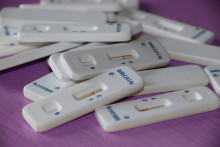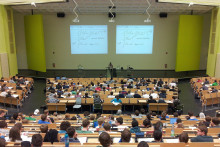The UT alumna chose to study the impact of Covid-19 on physicians because she felt the topic deserved more attention. ‘I found that a lot of existing research focused on wellbeing of patients, not doctors. But the wellbeing of physicians also influences patients,’ says Sander, who defended her Master thesis this autumn and now works as International Affairs & Mobility officer at the UT.
‘The effects of the pandemic on doctors have been mentioned in research, but rather vaguely,’ continues the alumna. ‘We knew physicians’ wellbeing has diminished, but we didn’t know exactly how and why. Moreover, research into wellbeing usually focused on topics such as burnout or depression, but wellbeing is so much more than that. It’s also about being able to function to your full potential.’
Changes in daily routine
Based on responses from thousands of doctors from all over the Netherlands, Lotte Sander was able to evaluate how the physicians’ daily working life changed during the Covid-19 crisis and how this affected their wellbeing. ‘I found out that the impact was both positive and negative.’
Research
Lotte Sander’s research, supervised by professor Tanya Bondarouk and Myra van der Goor, was possible thanks to data provided by Q3, a consultancy company specialized in supporting medical specialists. The data for the study were collected between September 2020 and June 2021.
Sander’s findings showed that doctors mainly had to deal with changes such as switching from hospital to home office, digital patient communication, rescheduling due to understaffing, scaling down regular care and having to assist at ICU, and stagnation of projects and developments.
‘The impact of these changes definitely wasn’t only negative,’ says Sander. ‘For example, the switch to home office had a positive effect, because for some doctors this led to a better work-life balance and increased productivity. The rescheduling due to understaffing actually also had a positive impact, because in those situations doctors often had to work in small teams, where they could create a sense of comradery and feeling of being united.’
The most outstanding negative development was stagnation of projects, explains the young alumna. ‘Due to the pandemic, many planned projects stopped. This factor was perceived as negative by nearly all respondents, because it also meant their personal and professional development had to be put on hold.’
‘Not one size fits all’
‘These are the general findings, but the impacts always depend on the individual person,’ stresses Sander. ‘It is not one size fits all.’ This is also the alumna’s main recommendation to hospital HR. ‘You need to make sure that everyone can do what is in their own best interest,’ she says.
Lotte Sander’s findings have also been published as an e-book, which has been distributed among all the participants of her study. You can find the book here.








